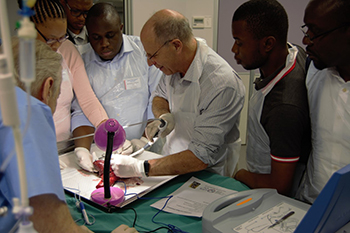Latest News Archive
Please select Category, Year, and then Month to display items
12 October 2020
|
Story Arina Engelbrecht
|
Photo Supplied
 Arina Engelbrecht from Organisational Development and Employee Well-being believes physical activity has a number of benefits for one’s health, including stress relief.
Arina Engelbrecht from Organisational Development and Employee Well-being believes physical activity has a number of benefits for one’s health, including stress relief.
Being physically active plays a big role in preventing the development of mental-health problems and in improving the quality of life of people experiencing mental-health problems.
Treatment for depression
Physical activity can be an alternative treatment for depression. It can be used as a stand-alone treatment or in combination with medication and/or psychological therapy. It promotes all kinds of changes in the brain, including neural growth, reduced inflammation, and new activity patterns are formed that promote feelings of calm and well-being. It releases endorphins – powerful chemicals in the brain that energise your spirit and make you feel good.
Physical activity can be very effective in relieving stress. Research in adults has found that physically active individuals tend to have lower stress levels compared to individuals who are less active. It also leads to improved sleep. When a person sleeps better and feels more rested, overall quality of life improves. They cope better with daily life stressors.
Reduce Alzheimer's risk
Regular physical activity can reduce your risk of developing Alzheimer's disease by up to 50%. It can also slow down further deterioration in those who have already started to develop cognitive problems. It stimulates the brain’s ability to maintain old connections as well as to make new ones.
A study asked people to rate their mood immediately after periods of physical activity (e.g. going for a walk/run, cycling, doing housework) and periods of inactivity (e.g. reading a book or watching television). Researchers found that participants felt more content, more awake, and calmer after being physically active compared to after periods of inactivity.
In conclusion, people who are physically active feel a sense of well-being, feel more energetic throughout the day, sleep better at night, have sharper memories, and feel more relaxed and positive about themselves and their lives.
“Being physically active not only changes your body, it changes your mind,
attitude, and your mood.” – Arina Engelbrecht
Great turnout for Hannes Meyer Symposium in Cardiothoracic Surgery
2017-05-05

Symposium attendees watch attentively as
Dr Johan Brink demonstrated a MAZE procedure
with a pig’s heart.
Photo: Supplied
The University of the Free State’s Faculty of Health Sciences hosted the annual Hannes Meyer Symposium in Cardiothoracic Surgery. The symposium was organised by Prof Francis Smit, head of the department of Cardiothoracic Surgery at the UFS, with the support from the Society of Cardiothoracic Surgeons of South Africa and the European Association of Cardiothoracic Surgery (EACTS). Over the past 16 years this symposium has steadily been growing in stature and prestige leading to the resounding success that was this year’s event.
Medical advancements explored
The aim of the symposium is to provide an overview of the latest advances in Cardiothoracic Surgery and perfusion as well as providing hands-on training via simulation to trainees from South Africa and the rest of the African continent. Didactic lectures and papers by registrars were an integral component of the symposium. The South African community was represented by various heads of departments, trainees, senior specialists and perfusionists from all the training centres in the country. There were also delegates representing Uganda, Mozambique, Nigeria and Zambia.
Heart surgery off to new heights
Simulation in Cardiothoracic Surgery and Perfusion can be compared to airline pilots with high risk, with complex surgeries being first done in simulators before being attempted in the real world. The UFS is proud to have a state-of-the-art simulation facility, which was used to facilitate the programme.
The range of simulation was extensive and included simple procedural models to complex full theatre setups with Human Performance Models in perfusion that simulated crisis scenarios with the aid of computerised devices that react in real time to human intervention.
Industry support highly appreciated
This event was coordinated by Dr Jehron Pillay, senior registrar in the Department of Cardiothoracic Surgery and Marilee Janse van Vuuren, deputy-director clinical technology, in the department. This was the first time that such extensive simulation models were used in the programme and judging from the positive response received, it has certainly set the benchmark for all future events.
The event has received invaluable support over the years from EACTS that has selected Bloemfontein as the site of its African training programme as a result of the high level of training and education achieved here.
The academic discussions were chaired by Profs Marko Turina and Jose Pomar (past presidents of EACTS) and Pieter Kappetein (past secretary general of EACTS) who are extremely well known internationally for their contribution to advancing Cardiothoracic training and education.
Our guests from EACTS presented didactical lectures on research methodology, international randomised trials and discussed recent developments and controversies in cardiothoracic surgery.
Registrars from all South African units presented a thoracic and cardiac surgery paper from each unit highlighting specific disease conditions, moderated by heads of departments and the international panel.
An event of this magnitude requires significant financial support and the medical industry in South Africa stepped up to the plate in providing financial and logistical support in order to make it possible.